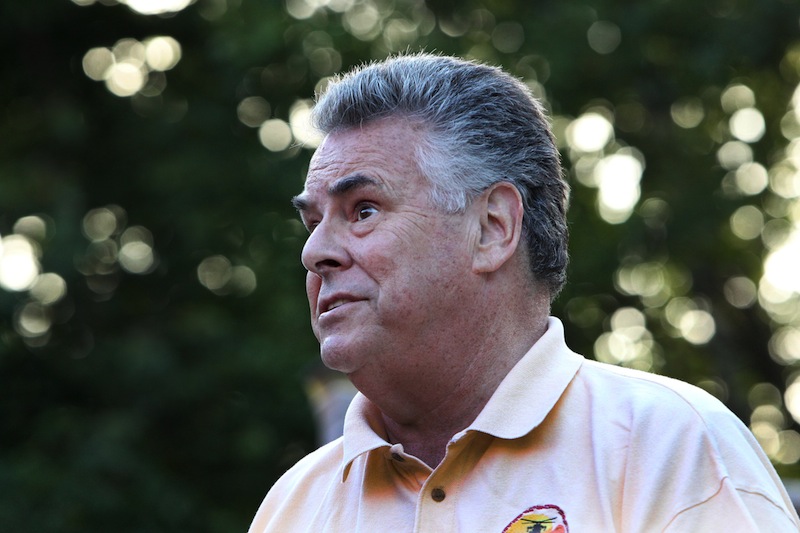WOLFEBORO, N.H. – New York Rep. Peter King acknowledges he’d have a double motive as a presidential candidate — winning the White House and stopping what he calls a dangerous shift in the GOP toward an isolationist foreign policy, perhaps the more achievable of the two objectives.
Largely unknown to most Americans, King has used his post as chairman of the House Homeland Security counterterrorism and intelligence subcommittee to become one of the Obama administration’s chief critics on international affairs. And he promises that his passion for a strong national defense would dominate his campaign, which would make King simply the latest politician to push a pet issue as a centerpiece of a presidential bid.
“We have to go back to being the party of national defense,” the 11-term congressman said Monday while touring this town on the shores of Lake Winnipesaukee. It was King’s first visit to the first-in-the-nation-primary state since early this summer, when he first dangled the prospect of running for president.
Polls suggest that King would begin a presidential race with a huge vulnerability_he is largely unknown to the majority of Americans. Nevertheless, history suggests that King, like other single-issue candidates in the past, could play a significant role in shaping the presidential contest.
A long line of politicians have used a presidential campaign to help shift their party’s dominant philosophy on issues from immigration to federal deficits, even while falling fall short of winning their party’s nomination.
Former Pennsylvania Sen. Rick Santorum became a top-tier contender in the 2012 race with a campaign partly designed to emphasize social conservative values. At the same time, then-Rep. Ron Paul of Texas generated a passionate following and helped resurrect the libertarian movement in a 2012 presidential bid focused largely on dismantling the federal government.
“True single-issue candidates don’t typically succeed at the ballot box, but they can provide an invaluable service in raising awareness about substantive issues that get buried in the daily grind of a campaign,” said New Hampshire Republican strategist Jim Merrill, who led Mitt Romney’s efforts in this state.
Merrill, who described King as “the classic definition of a primary long-shot,” cited businessman Steve Forbes, whose 1996 and 2000 presidential campaigns centered on his support for a flat income tax that “forced other candidates to wade into the deep end of the policy pool on federal tax reform, an issue that might have otherwise gotten the cursory sound bite treatment.”
Independent candidate Ross Perot captured nearly 19 percent of the national popular vote in 1992 in a presidential campaign focused almost exclusively on reducing the national deficit. And former Colorado Republican Rep. Tom Tancredo’s 2008 campaign centered on fighting illegal immigration — an issue that still consumes Republican activists.
But King, 69, says he’s not willing to term himself as a single-issue candidate.
“I don’t want it to sound like I’m looking for a consolation prize,” he said, noting that should he run he’d be on “a dual track” to win and balance the increasingly vocal libertarian wing of the GOP — led by possible presidential contenders like Sens. Rand Paul, R-Ky., and Ted Cruz, R-Texas — who support significant reductions in U.S. foreign aid and military involvement abroad.
“We are the No. 1 target in the world of Islamic terrorists,” he told roughly 50 New Hampshire supporters — many of them with New York roots — gathered at a backyard barbecue. “I would love if we never had to send one solider overseas, or if we never had to be involved in any country in the world. But we live in a dangerous world and we don’t have that luxury.”
His remarks came soon after the State Department announced plans to keep facilities in 19 cities closed through the end of the week because of terrorist “chatter.”
King’s path to relevance in the 2016 presidential contest is unclear.
For now, he says he’s serving as his own manager of a campaign he hasn’t yet formally launched. He has yet to conduct his own polling, expand his staff or court new donors, steps serious contenders typically take even at this early stage. And he hasn’t scheduled trips to other early voting states aside from New Hampshire.
While congressional seniority may offer him considerable influence in Washington, King is largely unknown across New Hampshire. A Quinnipiac University poll released Monday shows that most of the electorate didn’t know enough about him to have an opinion.
King laughed off the results.
“I don’t want to peak too early,” he said with a smile outside Lino’s restaurant in Wakefield, where shared breakfast on Monday with wife, daughter and two grandchildren.
Some diners had little idea who he was even after he introduced himself. But Lino’s regular John Sullivan said he recognized him immediately.
“He seems like a straight shooter,” Sullivan said.
It’s far too early to know what the political landscape will be in 2016. But in an election focused on national security, political operatives say King would enjoy an inherent advantage.
“It’s the summer before the summer before the summer before the New Hampshire primary, and so it shouldn’t be a surprise that people have yet to put odds on a Peter King run for president. There’s plenty of time to see what he brings to the table,” said New Hampshire-based Republican strategist Jamie Burnett.
New Hampshire voters will get another look soon. King says he’s already scheduled to return twice in September.
Send questions/comments to the editors.



Comments are no longer available on this story